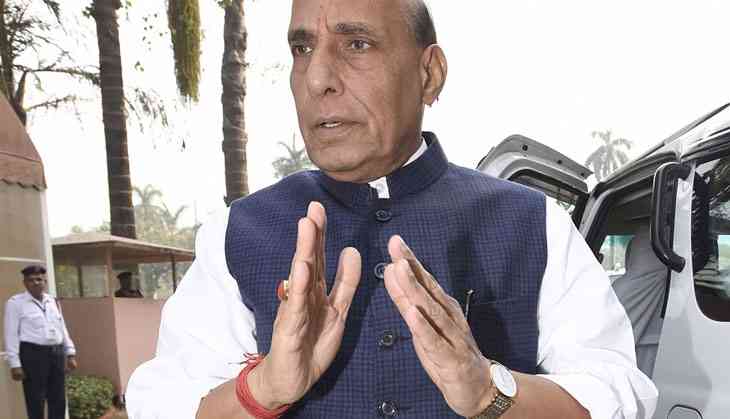
His face looks well-tanned – especially in contrast with his trademark crisp dhoti and kurta.
Home Minister of India and former chief minister of Uttar Pradesh, Rajnath Singh, seems tired after a full day’s campaigning.
Wiping the weariness of a long day off his face, he says with a smile, “I have addressed my 111th public rally of this election campaign today.”
He claims that the Bharatiya Janata Party (BJP) is getting an absolute majority. Not that one expects the tallest leader of the party in the state to say anything else in the middle of an election.
Despite Prime Minister Narendra Modi warning voters at his public rally in Mau against voting for a hung Assembly, Singh says there is no question of a split verdict. “The UP Assembly will not be hung. I can see that clearly,” he declares.
How does he know for sure? “As a politician you get a sense from the enthusiasm of the crowd. Our public meetings are organised constituency-wise and from the energy of the crowd and the sloganeering you can tell a lot. I see the same enthusiasm as in (the general election of) 2014. Nothing has changed,” he claims.
Rajnath Singh says the election is going in the BJP’s favour as all non-Yadav OBCs (Other Backward Classes) or ati-pichada and ati-Dalit (most backwards among Dalits) are voting for the party en masse.
This is formulaic and most election observers doubt this. However, Singh rejects any suggestion that this is not the case on the ground despite anecdotal evidence to the contrary.
He insists, “The BJP has come back to my formula. As chief minister in 2001, I had introduced job reservation for the ati-pichada (Most Backward Classes) within the existing OBC quota and for the ati-Dalit within the SC/ST quota.
“I had even selected people based on the new criterion for government jobs but then Mayawati took over the reins (in the state) and reversed the decision. Today they are all with us.”
He displays no misstep, when questioned about the use of communally divisive language by Prime Minister Narendra Modi in this campaign. “What he wanted to say was that we will not discriminate against anyone based on caste, community or religion. There is confusion being created by the so-called secular parties about us and the minority community. You will see that with time this too will disappear,” he explains donning an expressionless face.
What about all the allegations about more electricity being supplied on minority festivals than on Hindu festivals by the Samajwadi Party government of Akhilesh Yadav? Was that allegation not intended to communally divide the voters? Rajnath Singh laughs and deflects the question saying, “Arre bhai, Akhilesh ne bijli dee kisko hai (Akhilesh has not supplied electricity to anyone)? But the public perception remains that his party is wooing the minority vote. What we want to say emphatically is that we will not discriminate against anyone. That is the approach we want to highlight.”
About not fielding a single Muslim candidate in UP where one in five residents belongs to the minority community, Singh says, “We have no allergy to the minorities. Initially the election seemed a bit difficult and so winnability was the main criterion (for candidate selection) at that time.”
Why did the election seem difficult initially? “Because of the noise created by the media about the SP-Congress alliance,” he explains. “But then when we went into the field we realised the election was going in our favour,” he adds.
Singh defends demonetisation equally vigorously. “Notebandi has helped us. It was never a political decision but our opponents made it a political issue. The people, however, support us. They recognise that notebandi was against black money, corruption and to prevent terror-funding.”
Just then in walked in a well-known TV journalist who had spent quite some time covering the election campaign in the state. Rajnath Singh greets him and before giving his usual spiel of the BJP winning hands down asks him, “What is your assessment after travelling around?”
Clearly, elections have become difficult to predict even for veteran politicians.
First published: 1 March 2017, 22:18 IST


